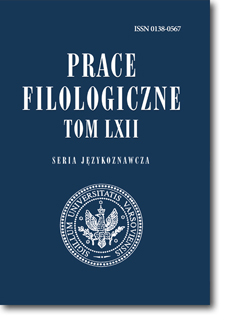Co można zrobić {niechcący}? (Rekonesans)
What One Can Do {niechcący} (‘Unwillingly’) (Preliminary Diagnosis)
Author(s): Izabela Duraj-NowosielskaSubject(s): Language and Literature Studies
Published by: Wydział Polonistyki Uniwersytetu Warszawskiego
Keywords: agentywność; intencjonalność; modyfikatory intencjonalności działania; {niechcący}; przysłówek; semantyka leksykalna; adverb; agentivity; intentionality; intentionality modifiers; compositional semantics; lexical semantics; {unwilligly}
Summary/Abstract: In the article I describe certain elements of the thematic dictum of the adverb {niechcący} [unwillingly] (used in the unstressed position before predicate), i.e. those that present semantic restrictions on the verb qualified by that adverb. So, what x did {niechcący} [unwillingly] (q), doing (intentionally) something else (p), is such that: 1) at the time t (of the action p) x could (was able to) think that by doing p x can cause q (component [a]), but x must not have been convinced of it [b]; 2) at the time t x c o u l d want o r not want q [a’], but the speaker had reasons to think that x would rather n o t want q [c].
Journal: Prace Filologiczne
- Issue Year: 2011
- Issue No: 62
- Page Range: 105-118
- Page Count: 14
- Language: Polish

